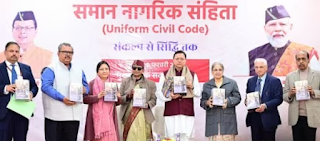EXCLUSIVE | Uttarakhand UCC draft recommends exemption of tribals; banning of halala, triple talaqUttarakhand government to prepare Bill based on the committee’s proposals, Assembly to hold a special session on February 5 to discuss and pass it
In a crucial step, the committee’s report, sources told LAKSHY DREAM FOUNDATION GLOBAL NEWS , recommended the exemption of tribals, who have been voicing their dissent against UCC, from the purview of the Bill because of the special status granted to them. Uttarakhand has a 2.9% tribal population and notable groups include the Jaunsari, Bhotiyas, Tharus, Rajis, and Buksas.
Sources said among the key aspects of the report was making halala, iddat, and triple talaq — which are practices governing marriage and divorce as per the Muslim personal law — punishable offences. Polygamy has also been recommended for a ban.
It is also learnt that the committee has suggested mandatory registration for live-in relationships. The draft, sources said, also proposes making the legal age for marriage uniform across all religions. To make adoption rights the same for all, recommendations have been given to uniformly follow the existing laws under the Juvenile Justice (Care and Protection of Children) Act.
In its Budget presented on Thursday, the Centre announced plans to form a high-powered committee to deal with challenges arising from fast population growth and demographic changes. Suggestions on the matter were also expected to be part of the UCC Bill as well. However, sources said the report had made no recommendations on population control.
Draft UCC law soon: Dhami
The 800-page report is divided into four volumes. First is the committee report, the second is the draft code in English, the third is a public consultation report of the committee, and the fourth volume is the draft code in Hindi.
Addressing the media, Chief Minister Pushkar Singh Dhami spoke of the “promise” the BJP had made before the Legislative Assembly elections in 2022 to implement the UCC. He said as per his promise, a committee headed by retired Supreme Court judge Ranjana Prakash Desai was formed at the first Cabinet meeting. After examining the report, the government would prepare a draft UCC law soon, Dhami said.
Since the committee’s formation, it has received over 2.3 lakh suggestions from the public, most of which were received through letters, registered posts, emails, and written suggestions through its online portal. By September last year, the committee had also held 38 public meetings across the state and received suggestions through public interactions.
State government sources said the committee started consultations for the Bill through a public dialogue program from a village named Mana and received suggestions from all sections of people in all the districts of the state as well as Uttarakhand residents living in Delhi. A total of 72 meetings were called to interact with around 10,000 people and study the suggestions received.
Won’t be easy to implement UCC: Congress
Reacting to the draft, Uttarakhand Congress chief spokesperson Garima Mehra Dasauni said, “It will not be easy for the state government to implement the UCC”.
“If the government had presented the draft, it would have been known on which subjects the government wants uniformity and equality. UCC is a subject of the concurrent list, which means both the Centre and the state can make laws on this subject. But whenever the Centre makes a law, it will be an umbrella law, and then the laws made by the states will be ineffective or will be merged,” she said.
Muslim Seva Sangathan president Naeem Qureshi said he had not seen the draft so far but added that the organisation would protest against it if it “affects personal and religious rights”. “This whole discussion is of the civil laws and the criminal laws are the same throughout the country, accepted by all. If these civil laws are for development and betterment, we will accept them. But if someone is made a target for politics, we have the right to protest against the policies of the government. Once we have studied the draft, and feel like our personal and religious rights are affected, we will protest,” he said.




Comments
Post a Comment